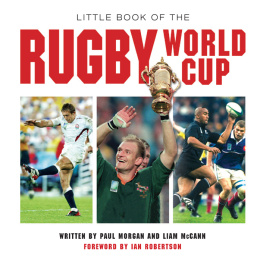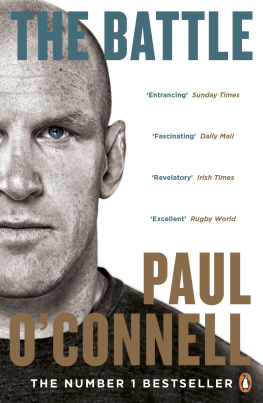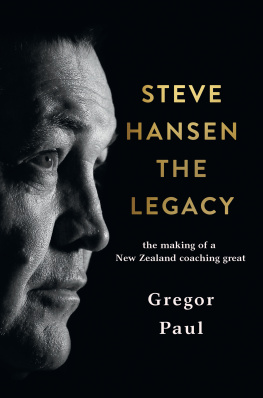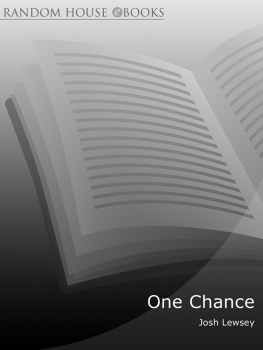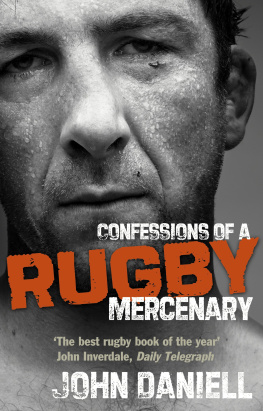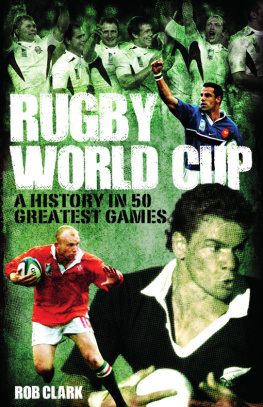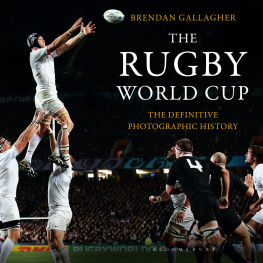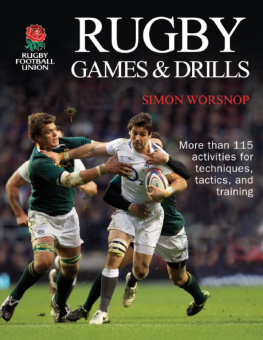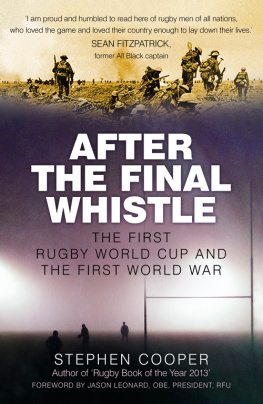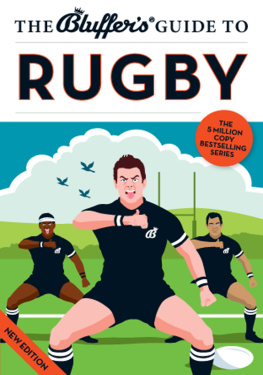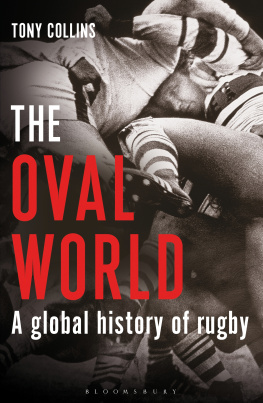Paul Morgan - Little Book of the Rugby World Cup
Here you can read online Paul Morgan - Little Book of the Rugby World Cup full text of the book (entire story) in english for free. Download pdf and epub, get meaning, cover and reviews about this ebook. year: 2015, publisher: G2 Rights Ltd, genre: History. Description of the work, (preface) as well as reviews are available. Best literature library LitArk.com created for fans of good reading and offers a wide selection of genres:
Romance novel
Science fiction
Adventure
Detective
Science
History
Home and family
Prose
Art
Politics
Computer
Non-fiction
Religion
Business
Children
Humor
Choose a favorite category and find really read worthwhile books. Enjoy immersion in the world of imagination, feel the emotions of the characters or learn something new for yourself, make an fascinating discovery.
- Book:Little Book of the Rugby World Cup
- Author:
- Publisher:G2 Rights Ltd
- Genre:
- Year:2015
- Rating:3 / 5
- Favourites:Add to favourites
- Your mark:
- 60
- 1
- 2
- 3
- 4
- 5
Little Book of the Rugby World Cup: summary, description and annotation
We offer to read an annotation, description, summary or preface (depends on what the author of the book "Little Book of the Rugby World Cup" wrote himself). If you haven't found the necessary information about the book — write in the comments, we will try to find it.
Little Book of the Rugby World Cup — read online for free the complete book (whole text) full work
Below is the text of the book, divided by pages. System saving the place of the last page read, allows you to conveniently read the book "Little Book of the Rugby World Cup" online for free, without having to search again every time where you left off. Put a bookmark, and you can go to the page where you finished reading at any time.
Font size:
Interval:
Bookmark:
LITTLE BOOK OF THE
THE GREATEST SHOW ON EARTH
First published in the UK in 2007. Updated in 2015
G2 Rights Ltd 2015
www.G2ent.co.uk
Publishers Edward Adams & Jules Gammond
All rights reserved. No part of this work may be reproduced or utilised in any form or by any means, electronic or mechanical, including photocopying, recording or by any information storage and retrieval system, without prior written permission of the publisher.
ISBN 978-1-782815-45-7
eISBN 978-1-782812-79-1
The views in this book are those of the author but they are general views only and readers are urged to consult the relevant and qualified specialist for individual advice in particular situations.
G2 Rights Limited hereby exclude all liability to the extent permitted by law of any errors or omissions in this book and for any loss, damage or expense (whether direct or indirect) suffered by a third party relying on any information contained in this book.
All our best endeavours have been made to secure copyright clearance for every photograph used but in the event of any copyright owner being overlooked please address correspondence to G2 Rights Limited, Unit 7-8, Whiffens Farm, Clement Street, Hextable, Kent BR8 7PQ.

I have covered all seven World Cups from the first in New Zealand and Australia in 1987 to the most recent in New Zealand in 2011.
They have grown in stature and global significance on every occasion and there is no doubt that the 2015 World Cup will be the biggest and best and attract the largest worldwide audience.
It is guaranteed to be a massive financial success but it is also going to be a tournament to savour from the opening match at Twickenham between England and Fiji to the Final six weeks later.
The Rugby World Cup is one of the biggest events in the sporting calendar alongside the Olympics and the FIFA World Cup. Of the seven previous winners only one Northern hemisphere team has won - England in Sydney in 2003 when they beat Australia.
That day I came quite close to producing a half decent commentary when I described Jonny Wilkinsons drop goal to win the World Cup for England in the final minute of extra time.

Ian Robertson has seen it all in rugby and heads into his eighth World Cup
It was at the same time, potentially, a commentary fraught with a very different outcome. Jonny had kicked 21 drop goals for England but all with his left foot. This was with his right foot.
I was perched in an eyrie in the back of the main stand about 60 metres from the near touch line. The drop goal was struck a further 40 metres from that near touch line in mid-field. As he kicked the ball, I grabbed my binoculars for reassurance and it was with great relief that I saw it was indeed Jonny and not Mike Catt that had hit the goal. He was some 100 metres away - a small dot on the horizon!
The final whistle blew and I knew I had not covered the most iconic moment in Englands rugby history too badly when John Inverdale - a man not known for idle flattery - said, I can safely say that wasnt the worst commentary youve ever done

With only seconds left on the clock, deep into extra time, Jonny Wilkinson dispatched a perfect drop goal to seal a 17-20 victory over Australia in the 2003 World Cup final
Like the whole rugby world I am looking forward enormously to the 2015 World Cup. It promises to be a very special tournament.
ALTHOUGH THE FIRST RUGBY World Cup was held in 1987, ever since the first Test matches, in 1871, sides across the world have claimed the unofficial title of the best rugby team on the planet.
At the start only England and Scotland battled for the title but by the 1920s it was accepted that the epic series between New Zealand and South Africa was deciding who were the unofficial world champions.

An early match between England and Scotland in the Athletic Grounds at Richmond, 1891
Other sides most notably Wales in the early 1970s laid claim to their unofficial title but for the decades either side of the war it was either the Springboks or the All Blacks who were the team to beat.
The closest rugby got to anointing an official world champion before 1987 was at the Olympic Games, where rugby was included in four Games between 1900 and 1928.
France won the first gold medal and USA the last before the Olympic committee removed rugby from their list of sports.
With football starting its World Cup in Uruguay in 1930, it was inevitable that rugby would go the same way at some point. Perhaps the only mystery is why it took so long?
The length of the time could probably be attributed to rugbys roots as an amateur sport.
Some leading nations were fervent campaigners of the amateur traditions right up until the game turned professional, in 1995. Some, like England, even opposed the World Cup when it was first mooted in the late 1970s, for fear of it leading to a professional game.
It was not until late 1983 that the Australian Rugby Union and New Zealand Rugby Football Union submitted written proposals to the International Rugby Board (IRB) for a World Cup.
Neither was aware of the others proposal with Australia wanting to stage a tournament to coincide with their Bicentenary in 1988 and New Zealand proposing the previous year.
Both proposals were turned down but the two countries pooled their resources to conduct a feasibility study to be presented at the IRBs annual meeting in March 1985.
But it took the IRB until 1985 before they took their momentous decision, at their annual meeting in Paris, two years after the similar proposal was rejected.
New Zealand had been at the centre of the campaign for a World Cup since 1983, Australia joining the campaign a year later.
At the 1985 meeting - chaired by Australias Dr Roger Vanderfield - it certainly wasnt a unanimous decision with the British and Irish unions initially sceptical, although today the Rugby World Cup is one of the top three sporting events (behind the Olympics and the Football World Cup) in the world.

During the 1924 Olympics, rugby was played at the Colombes Stadium in Paris
Only a two-thirds majority was in fact required at the IRB Executive and it was resolved to stage a 16-team tournament.
France were in favour of the proposal on one condition: that the Tournament would not be restricted to the eight IRB members but would involve other countries to enable the game to reach a broader audience.
No one at that 1985 meeting could have considered how quickly the Rugby World Cup would grow, and the multimillion pound event staged by Australia in 2003 that captivated countries across the world was a stunning success.
Next pageFont size:
Interval:
Bookmark:
Similar books «Little Book of the Rugby World Cup»
Look at similar books to Little Book of the Rugby World Cup. We have selected literature similar in name and meaning in the hope of providing readers with more options to find new, interesting, not yet read works.
Discussion, reviews of the book Little Book of the Rugby World Cup and just readers' own opinions. Leave your comments, write what you think about the work, its meaning or the main characters. Specify what exactly you liked and what you didn't like, and why you think so.

